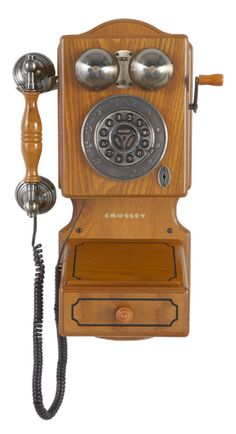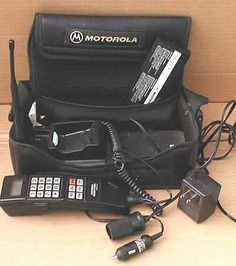We got our first phone when I was in the eighth grade. Of course, it was a marvel, but slowly we began to realize it had its drawbacks. Ours was a “party line”, meaning we shared the line with six other families. When you wanted to make a call you had to pick up the phone and make sure no one else was already on it. Since you had no clue who had picked up the phone while you were on a call, people could anonymously harass you by picking up and replacing the receiver every few seconds just to get you off the line. Folks could listen in on your calls too if you were not paying attention.
All phones in those days were rotary dial, so you had to crank the dial around and wait for it to spin back to the start position. I never thought that much of a problem until touch tone came into vogue.
The big break through for me happened when they came out with car phones. At the time, business for us was booming and my biggest customers were Sears Payment Systems and Discover Card headquartered in Chicago. We lived in the Oconomowoc, WI area, a two hour drive to their offices. These two customers demanded a lot of attention and I found myself driving down two to three times per week. That four hours of driving per day chopped a big chunk out of my work week. The car phone turned that dead time into productive time.
These early mobile phones were pretty clunky. A box a bit bigger than a loaf of focaccia bread resided in the trunk with a wire leading to an antenna screwed to the lid of the trunk. A speaker perhaps 4” X 5” X 5” sat on the hump between the passenger and driver foot wells and a microphone was mounted on the driver’s visor. The phone itself (weighing about two pounds) resided on a bracket within easy reach of the driver. Result…. you could do hands free talking and with speed dial not a lot of looking down from the road. My drive time became productive time for I could make, return and receive calls.
These car phones were not common at the time and many people had no idea they existed. This made for some funny incidents. Chicago, in its wisdom, had decided to collect its highway tolls $.35 at a time by erecting toll booths every few miles around the city. During busy travel times this inevitably created traffc jams as people slowed down to drop their change into the bucket or get change from the vendors. One day as we inched towards the toll booths I was on the phone and gesturing and laughing. I happened to glance over at the car in the lane next to me. There were three black kids peering out the window at me with expressions on their faces that said, “Now there’s one crazy white dude!” They clearly thought I was having a jolly old time talking to myself.
Telephone technology made incremental improvements as a communication device providing phone and texting. (Remember the Blackberry?) Then Steve Jobs introduced the frst iPhone on June 29,2007. It represented a paradigm shift in telephone technology. He added a microprocessor to the phone that already had a screen and a keypad and, voila’ you’ve got a computer! The rest is history.
Bill Melton, the founder and visionary of VeriFone created a similar paradigm shift in credit card terminals when he decided to put memory in VeriFone’s terminals ushering in data capture and eliminating the need to process all those paper credit card slips.
I, too, realized that a phone could be a computer back in the early ’90s…although not for portable phones. At the time we were representing VeriFone, the market leader in credit card terminals. My biggest customer, as I said, was Discover Card and SPS. VeriFone manufactured a smart (chip) card reader and my company had a relationship with a chip
card company in France.
While ubiquitous in France and throughout much of Europe, chip cards had failed to catch on in the US. VISA and Mastercard were balking at the cost of outftting all the merchants with smart card enabled terminals, and without them, it was diffcult to fnd a compelling application that would justify the cost.
There are two kinds of chip cards: Simple cards that can store a PIN number and do basic functions, and memory cards with a more sophisticated microprocessor and memory capabilities.
Those were the days before everyone had a cell phone in their pocket and ATT had hundreds of thousands of pay phones around the country. These phones had a small (4” x 4”) screen and, of course, a keypad. I reasoned that if they had a VeriFone smart card reader, a customer with a microprocessor card could insert the card and turn that phone into….. wait for it….a computer. The data, however, would be stored on the card.
Every traveling businessman, like myself, had a phone list in his briefcase and a fistful of frequent flier cards, frequent hotel cards and car rental cards. None of these represented anything more than a number stored in a computer somewhere. I reasoned that all of these numbers could be stored easily on a memory chip card and lighten the load of the business traveler. At that time, if you wanted to make a long distance call from a public phone you had to manually enter your ATT billing number that would then be charged to your home or business phone.
My idea was to have Discover Card come out with a smart chip card that they would offer to their “premium” customers. This card would store their ATT billing number, their phone list and their list of frequent user numbers. Discover would then be able to charge an annual fee for this card, something not done at the time for any card.
ATT, for its part, would begin to retrofit all its pay phones with VeriFone smart card readers to accept these cards. As the cards became commonplace, smart card reader-enabled credit card terminals would be available at check in desks of hotels and car rental agencies. At least, that was the dream.
This sale would be complicated. I had to convince not only Discover Card, but more importantly, ATT. I got Discover interested and they agreed to bring the ATT guys in for a meeting. On the day of the presentation I walked into the big conference room at Discover headquarters and there were about 20 big shots sitting around the massive table. The presidents of Discover and Sears Payment Systems were there, plus a bunch of VPs from Sears and ATT. I got up in front of the group and made my presentation. I thought it went well. Lots of questions and head nodding. At the end of the meeting, as I was walking out, a guy came up and introduced himself as the sales rep for ATT who handled the Discover and SPS accounts. He said, “I’ve been the rep here for a year and a half and I never even met half of the guys in this meeting! How the Hell did you manage to get all these guys together?” I had no answer, except that I had been there at the beginning and simply knew them all.
As it turned out, the idea fizzled in the wheels of bureaucracy. People in corporate culture do not get rewarded for taking chances. If they succeed, the higher ups take the credit. If they fail, their career is over or it’s back to the mail room.
Now, twenty years later, the credit card companies in the US are finally beginning to put chips on their credit cards and install chip card reader terminals at the points of sale. It’s still not fully implemented although it has been in Canada for the last ten years and in Europe since the 80’s.
Go figure.
Footnote:
While the new smart phones are amazing with cameras, email, video, WiFi and internet access, I am not sure they are a blessing. They have an addictive quality and touches of escapism. You see couples having dinner and each have their noses buried in their phones. I guess it avoids the messy business of conversation. Groups of teens siting together all working their phones with fashing fngers. They’re texting each other while sitting side by side. Impersonal interaction. And, of course, there’s the issue of being unable to turn the damn thing off while driving and the addiction of playing games on the device instead of reading a book. As I said, it’s all good.




Another fascinating and informative post! Thank you for writing again, Dick.
While modern telecommunications have irrefutably made correspondence more efficient, accessible and convenient, I personally would trade the entertainment of all the bells and whistles that my smart phone boasts for a good book or intriguing conversation with a human being in the flesh, concepts the majority of my generation likely deem antiquated. With that said, smart phones are indispensable assets in the business world.
Dick,
Great read. I enjoy your topics and your writing style. Keep up the great work!
hugs,
B